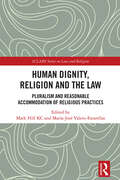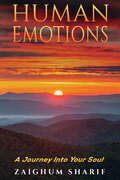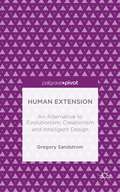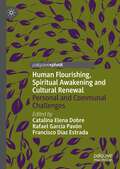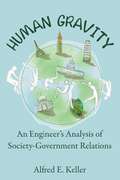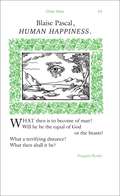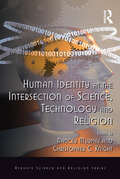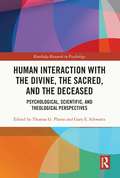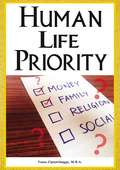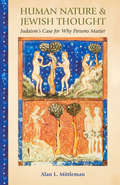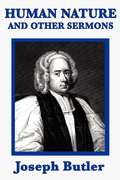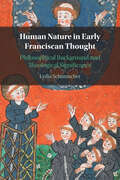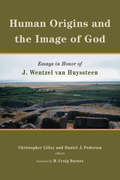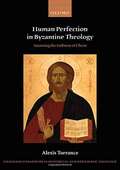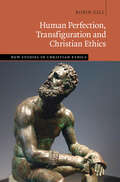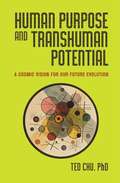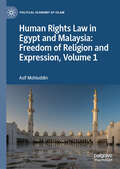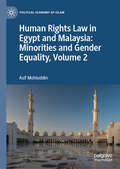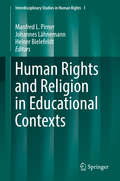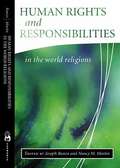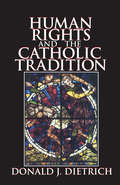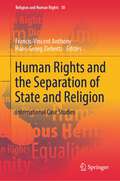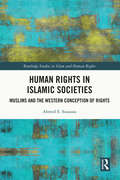- Table View
- List View
Human Dignity, Religion and the Law: Pluralism and Reasonable Accommodation of Religious Practices (ISSN)
by Mark Hill Kc María-José Valero-EstarellasThe concept of human dignity is already embedded in the constitutional architecture of the European Union and throughout the world, but it remains a slippery and elusive concept. In this volume, leading commentators from across the globe address the shift from the monolithic influence of major world religions in the past towards religious pluralism coupled with the increased secularism of civil society. The contributors, drawn from different backgrounds and traditions, explore how the deployment of a nuanced understanding of human dignity can provide a way to maximise religious liberty for all within liberal democracies. Specific consideration is given to the reasonable accommodation of religious practices through exemptions to generally applicable laws, conscientious objection on the grounds of religious beliefs, the interplay between religious pluralism and legal pluralism, balancing religious sensibilities with same-sex marriage, exercising the right to change one’s religion, both generally and with a particular focus on data protection, protecting the right to asylum in the light of recent changes in migratory flows and exploring its impact on those enjoying non-theistic beliefs, as well as the complex relationship between the Ukrainian and Russian Orthodox Churches in these febrile times. Through the prism of informed investigation of these matters of specificity, the volume offers readers fresh insights and analysis which collectively contribute to an overall picture of governments in liberal democracies being encouraged and enabled to foster laws and practices whereby pluralism can be encouraged, and human dignity can flourish. The book will be of interest to academics, researchers and policy-makers working in the areas of Law and Religion, Human Rights Law, Constitutional Law and International Relations.
Human Emotions
by Zaighum SharifEach and everyone of us has our own human emotions. Days can be filled with happiness whereas other days can be full of sadness. The uniqueness of one’s emotions can very rarely be understood by others. It is really difficult if not impossible to tell others how you feel or for them to understand how you are feeling. I have tried in this book to cover the inner most boundaries of human emotions splitting my poems into different realms of human thought. Hope, fate and destiny, joy, life, the world, loneliness, love, regrets, religion and the future are all covered in this book. I hope the reader can relate to and understand my poems and bring some perspective and reasoning towards their life. We are all not the same and never can be but we all have a heart and soul. By identifying these moments of thought I hope I can bring perspective and understanding to the reader. I hope you enjoy my book.
Human Extension: An Alternative to Evolutionism, Creationism and Intelligent Design
by Gregory SandstromThis book proposes a new angle on the controversy over evolution as a biological theory, creation as a theological/worldview doctrine and evolutionism, creationism and Intelligent Design theory as social ideologies. Rather than presenting a polemic that will enrage or delight one camp or another, this book proposes that a cease-fire is possible.
Human Flourishing, Spiritual Awakening and Cultural Renewal: Personal and Communal Challenges
by Francisco Díaz Estrada Catalina Elena Dobre Rafael García PavónThis book seeks to generate a theoretical and a reflective framework to re-connect people with culture and spirituality. It seeks to recreate important links between these domains to provide interpretative, foundational, and ethical perspectives. It is distinctive in that it focusses on the challenges that humanity is facing at a cultural, social, moral, and spiritual level. It provides a philosophical understanding of humanity from a humanistic and multidisciplinary perspective (encompassing ethics, language, art/cinema, political, cultural and gender approaches) and offers a variety of ways of how we can rethink our culture and our society for the future.
Human Gravity: An Engineer’s Analysis of Society-Government Relations
by Al KellerHumanity lives inside 4 unyielding constraints, the speed of light, conservation of mass-energy, inefficiency in conversion of heat to work, and the law of demand. Society forms to deal with constraint. Government and religion set boundaries for society to deal with modeling and manipulating constraint.A societal dimension, moral consequence, and a government dimension, fairness, can be developed from mass-energy conservation equations for Society and its Economy. A model is proposed to relate these dimensions developing the Societal Operating Line (SOL) and definition of Productivity.The stability of a society can be determined by the forces applied to the SOL. A stable society will balance the forces of productivity and order versus the force of adversity. A special case of the forces acting on the SOL leads to the definition of a right, the fundamental building block of a Free Society.Improving fairness by government taking productivity from society is the basis for the Managed Society. In order to make society fairer, government takes more productivity and reduces the free exercise of rights to the point of demanding complete conformity.Government&’s role in a Free Society can be modeled by comparing the economic function of society with a common engineering structure-the boiler. This role is likened to keeping the boiler water clean by removing contamination through &“blowdown&”. In a Managed Society, government manipulates &“blowdown&” to increase its power and influence.Applying these engineering models helps us to understand the material and energy balances of our societal-government relationship. A Free Society is shown to prosper because of unbound spiritual energy transfer while a Managed Society is shown to be limited by the finite distribution of things.
Human Happiness (Penguin Great Ideas)
by Blaise PascalCreated by the seventeenth-century philosopher and mathematician Pascal, the essays contained in Human Happiness are a curiously optimistic look at whether humans can ever find satisfaction and real joy in life – or whether a belief in God is a wise gamble at best. Throughout history, some books have changed the world. They have transformed the way we see ourselves – and each other. They have inspired debate, dissent, war and revolution. They have enlightened, outraged, provoked and comforted. They have enriched lives – and destroyed them. Now Penguin brings you the works of the great thinkers, pioneers, radicals and visionaries whose ideas shook civilization and helped make us who we are.
Human Identity at the Intersection of Science, Technology and Religion (Routledge Science and Religion Series)
by Christopher C. KnightHumans are unique in their ability to reflect on themselves. Recently a number of scholars have pointed out that human self-conceptions have a history. Ideas of human nature in the West have always been shaped by the interplay of philosophy, theology, science, and technology. The fast pace of developments in the latter two spheres (neuroscience, genetics, artificial intelligence, biomedical engineering) call for fresh reflections on what it means, now, to be human, and for theological and ethical judgments on how we might shape our own destiny in the future. The leading scholars in this book offer fresh contributions to the lively quest for an account of ourselves that does justice to current developments in theology, science, technology, and philosophy.
Human Interaction with the Divine, the Sacred, and the Deceased: Psychological, Scientific, and Theological Perspectives (Routledge Research in Psychology)
by Gary E. Schwartz Thomas G. PlanteHuman Interaction with the Divine, the Sacred, and the Deceased brings together cutting-edge empirical and theoretical contributions from scholars in fields including psychology, theology, ethics, neuroscience, medicine, and philosophy, to examine how and why humans engage in, or even seek spiritual experiences and connection with the immaterial world. In this richly interdisciplinary volume, Plante and Schwartz recognize human interaction with the divine and departed as a cross-cultural and historical universal that continues to concern diverse disciplines. Accounting for variances in belief and human perception and use, the book is divided into four major sections: personal experience; theological consideration; medical, technological, and scientific considerations; and psychological considerations with chapters addressing phenomena including prayer, reincarnation, sensed presence, and divine revelations. Featuring scholars specializing in theology, psychology, medicine, neuroscience, and ethics, this book provides a thoughtful, compelling, evidence-based, and contemporary approach to gain a grounded perspective on current understandings of human interaction with the divine, the sacred, and the deceased. Of interest to believers, questioners, and unbelievers alike, this volume will be key reading for researchers, scholars, and academics engaged in the fields of religion and psychology, social psychology, behavioral neuroscience, and health psychology. Readers with a broader interest in spiritualism, religious and non-religious movements will also find the text of interest.
Human Life Priority
by Dr. Yunus CiptawilanggaAs for this first book, each topic of the books explains the following matters:Human Life PriorityThe writer thought of this topic because when he came to a funeral, a question would often pop up: "Actually, what is a human being&’s main task in this life?" And it turned out that it has also been thought over by Solomon and discussed in the book of Ecclesiastes.The Value of SalvationMany God's children falling away; they give up their faith and become followers of another religion due to persecutions, positions, wealth, and life partner, and one of the main reasons is because they do not know how invaluable the salvation they have gained when they accept Jesus Christ as their Lord and Savior.The Rights and Responsibilities of God&’s ChildrenAs Christians, we are God&’s children. However, we often assume those terms &“children of God&” and &“Father&” just as &“titles&” not as &“status&”. That&’s why we are less aware that we truly have the status or position as God&’s children with their rights and responsibilities. We would be overwhelmed when we know how wonderful the rights God gives us as His children.The Foundations of ChristianityWe often heard of some Christians or even activists who were amazingly diligent in serving the Lord, suddenly left their faith for another belief. How could this happen? One of the main reasons is that their foundations of faith were not strong. Therefore, this topic is very important and fundamental for us to comprehend and possess.The Characteristics of Children of God,We know that the ones who will go to Heaven are God's children, not merely people who like to go to church. Therefore, it is important for us to know whether we are God&’s children, because if we turn out not to be His, then we will go to hell. The Lord Jesus describes in detail the characteristics of God&’s children.4 Types of ChristiansThe Parable of the Sower explains about four types of Christians where only the fourth types who will survive. Therefore, we need to study them while looking at which type of Christian we are today. If we are not yet the fourth type, then we must immediately change ourselves, so that we can enter the kingdom of God.Jesus versus MammonAs we live in an age wealth and riches are idolized like today, it is necessary for us to know what the characteristics of Christ&’s followers are referring to money or wealth. If mammon becomes primal in our lives, we will expel our Lord Jesus Christ from our hearts.The Great CommissionThe phrase&” in Jerusalem, and in all Judaea, and in Samaria, and unto the uttermost part of the earth&” (Acts 1:8) could perhaps be considered as one of our guidance today for evangelism. Although we do not live in the vicinity of Jerusalem, we can apply the principle of this phrase symbolically.
Human Nature & Jewish Thought: Judaism's Case for Why Persons Matter
by Alan L. MittlemanThis book explores one of the great questions of our time: How can we preserve our sense of what it means to be a person while at the same time accepting what science tells us to be true--namely, that human nature is continuous with the rest of nature? What, in other words, does it mean to be a person in a world of things? Alan Mittleman shows how the Jewish tradition provides rich ways of understanding human nature and personhood that preserve human dignity and distinction in a world of neuroscience, evolutionary biology, biotechnology, and pervasive scientism. These ancient resources can speak to Jewish, non-Jewish, and secular readers alike.Science may tell us what we are, Mittleman says, but it cannot tell us who we are, how we should live, or why we matter. Traditional Jewish thought, in open-minded dialogue with contemporary scientific perspectives, can help us answer these questions. Mittleman shows how, using sources ranging across the Jewish tradition, from the Hebrew Bible and the Talmud to more than a millennium of Jewish philosophy. Among the many subjects the book addresses are sexuality, birth and death, violence and evil, moral agency, and politics and economics. Throughout, Mittleman demonstrates how Jewish tradition brings new perspectives to--and challenges many current assumptions about--these central aspects of human nature.A study of human nature in Jewish thought and an original contribution to Jewish philosophy, this is a book for anyone interested in what it means to be human in a scientific age.
Human Nature and other Sermons
by Joseph ButlerJoseph Butler was an English bishop, theologian, apologist, and philosopher. He was born in Wantage in the English county of Berkshire. He is known, among other things, for his critique of Thomas Hobbes's egoism and John Locke's theory of personal identity. During his life and after his death, Butler influenced many philosophers, including David Hume, Thomas Reid, and Adam Smith.
Human Nature in Early Franciscan Thought: Philosophical Background and Theological Significance
by Lydia SchumacherIn this book, Lydia Schumacher challenges the common assumption that early Franciscan thought simply reiterates the longstanding tradition of Augustine. She demonstrates how scholars from this tradition incorporated the work of Islamic and Jewish philosophers, whose works had recently been translated from Arabic, with a view to developing a unique approach to questions of human nature. These questions pertain to perennial philosophical concerns about the relationship between the body and the soul, the work of human cognition and sensation, and the power of free will. By highlighting the Arabic sources of early Franciscan views on these matters, Schumacher illustrates how scholars working in the early thirteenth century anticipated later developments in Franciscan thought which have often been described as novel or unprecedented. Above all, her study demonstrates that the early Franciscan philosophy of human nature was formulated with a view to bolstering the order's specific theological and religious ideals.
Human Origins and the Image of God: Essays in Honor of J. Wentzel van Huyssteen
by Christopher Lilley and Daniel J. PedersenHow did human beings originate? What, if anything, makes us unique? These questions have long been central to philosophers, theologians, and scientists. This book continues that robust interdisciplinary conversation with contributions from an international team of scholars whose expertise ranges from biology and anthropology to philosophical theology and ethics. The fourteen chapters in this volume are organized around Wentzel van Huyssteen's pioneering work in human rationality, embodiment, and evolutionary history. Bringing a variety of diverse perspectives to bear on a hotly debated issue, Human Origins and the Image of God showcases new research by some of today's finest scholars working on questions regarding human origins and human uniqueness.
Human Perfection in Byzantine Theology: Attaining the Fullness of Christ (Changing Paradigms in Historical and Systematic Theology Series)
by Alexis TorranceTo what kind of existence does Christ call us? Christian theology has from its inception posited a powerful vision of humanity's ultimate and eternal fulfilment through the person and work of Jesus Christ. How precisely to understand and approach the human perfection to which the Christian is summoned is a question that has vexed the minds of many and diverse theologians. <p><p>Orthodox Christian theology is notable for its consistent interest in this question, and over the last century has offered to the West a wealth of theological insight on the matter, drawn both from the resources of its Byzantine theological heritage as well as its living interaction with Western theological and philosophical currents. In this regard, the important themes of personhood, deification, epektasis, apophaticism, and divine energies have been elaborated with much success by Orthodox theologians; but not without controversy. <p><p>Human Perfection in Byzantine Theology addresses the question of human perfection in Orthodox theology via a retrieval of the sources, examining in turn the thought of leading representatives of the Byzantine theological tradition: St Maximus the Confessor, St Theodore the Studite, St Symeon the New Theologian, and St Gregory Palamas. The overarching argument of this study is that in order to present an Orthodox Christian understanding of human perfection which remains true to its Byzantine inheritance, supreme emphasis must be placed on the doctrine of Christ, especially on the significance and import of Christ's humanity. The intention of this work is thus to keep the creative approach to human destiny in Orthodox theology firmly moored to its theological past.
Human Perfection, Transfiguration and Christian Ethics (New Studies in Christian Ethics)
by Robin GillMost people would agree that human perfection is unattainable. Indeed, theologians have typically expressed ambivalence about the possibility of human perfection. Yet, paradoxically, depictions of human perfection are widespread. In this volume, Robin Gill offers an interdisciplinary study of human perfection in contemporary secular culture. He demonstrates that the language of perfection is present in church memorials, popular depictions of sport, food, music and art, liturgy, and philosophy. He contrasts these examples with the socio-psychological concept of 'maladaptive perfectionism', using commercial cosmetic surgery as an example, as well as the 'adaptive perfectionism' suggested in the lives of Henry Holland, Paul Farmer, and, more ambivalently, Ludwig Wittgenstein. Gill then provides an in-depth analysis of New Testament and Septuagint usage of teleios and theological debates about the human perfection of Jesus. He argues that the Synoptic accounts of the Transfiguration offer a template for a Christian understanding of perfection that has important ecumenical implications within social ethics.
Human Purpose and Transhuman Potential: A Cosmic Vision for Our Future Evolution
by Ted Chu[from inside flaps] ""Today we stand at a new frontier. We have within our sight--if not yet within our reach--a radically new human freedom. It is the freedom from our inborn genetic condition--the liberation from the constraints of our biological form.... The human era as we have known it is coming to an end. The posthuman era is about to begin." So writes Ted Chu, in this magisterial treatment of the increasingly timely debate about transhumanism and the meaning and purpose of human evolution. A prominent macroeconomist and polymath, Chu offers the most systematic effort yet to explore the scientific, historical, ethical, and philosophical dimensions of this worldwide discussion, reframing a field too often disfigured by scientific reductionism. Chu immediately establishes an interdisciplinary and evolutionary stance and then examines the ongoing transhumanist project from a rich variety of perspectives. He goes on to articulate a goal for humanity in the face of technological breakthroughs that beckon us toward previously unimagined potentials for progress--that is, if we can find the courage to consciously manage our own evolution. A new understanding of transhumanism emerges as he plumbs the depths of the world's wisdom traditions and surveys the most cutting-edge evolutionary theories and scientific advances. While admitting that the pursuit of human happiness is appropriate and noble, Chu demonstrates why our ultimate purpose--our "new divine covenant"--is to serve the forward march of cosmic evolution through the transcendence of our own biology, thus making way for our evolutionary successors in the posthuman future."
Human Rights Law in Egypt and Malaysia: Freedom of Religion and Expression, Volume 1 (Political Economy of Islam)
by Asif MohiuddinThe discourse surrounding freedom of religion and expression in Muslim-majority countries is complex and multifaceted, shaped by a myriad of factors including cultural, political, and legal dynamics. This volume examines the complex interplay of these factors within the contexts of Egypt and Malaysia, offering valuable insights into the challenges and advancements in safeguarding these fundamental freedoms. From the diverse interpretations of Islamic principles to the varying legal frameworks and the influence of global events, such as geopolitical conflicts and terrorism, on human rights dynamics, this volume provides a comprehensive exploration of the complexities involved. Moreover, it delves into the historical, social, and political contexts that shape the protection and limitation of these freedoms, offering a nuanced understanding of the evolving discourse surrounding human rights in Muslim-majority countries. Through comparative analyses and discussions on the role of civil society and advocacy groups, this volume serves as an invaluable resource for scholars, policymakers, and activists seeking to deepen their understanding of the multifaceted realm of freedom of religion and expression in Egypt and Malaysia.
Human Rights Law in Egypt and Malaysia: Minorities and Gender Equality, Volume 2 (Political Economy of Islam)
by Asif MohiuddinIn Muslim-majority countries, safeguarding minority rights and advancing gender equality are vital components of the broader human rights discussion. Minority rights encompass various groups, including ethnic, religious, and linguistic minorities, who often face discrimination, marginalisation and unequal treatment within society. These challenges are rooted in historical, cultural and socio-political factors that shape legal frameworks and societal attitudes towards minority communities. Similarly, gender dynamics play a significant role in the human rights discourse in these nations, as women encounter various forms of discrimination and inequality, such as limited access to education, employment, and participation in decision-making processes. This volume explores the legal frameworks concerning minority rights and gender equality in Egypt and Malaysia, shedding light on the challenges faced by marginalised groups in these countries. It evaluates the effectiveness of legal instruments and mechanisms in addressing discrimination and promoting inclusivity within these societies. Furthermore, it examines laws, government policies and court rulings related to women’s rights, covering essential topics such as education, employment and political engagement. This volume offers valuable insights for policymakers, legal practitioners, academics and activists dedicated to understanding and advocating for human rights in these societies.
Human Rights and Religion in Educational Contexts
by Manfred L. Pirner Johannes Lähnemann Heiner BielefeldtWhat is the role of religion(s) in a human rights culture and in human rights education? How do human rights and religion relate in the context of public education? And what can religious education at public schools contribute to human rights education? These are the core questions addressed by this book. Stimulating deliberations, illuminating analyses and promising conceptual perspectives are offered by renowned experts from ten countries and diverse academic disciplines.
Human Rights and Responsibilities in the World Religions (Library of Global Ethics & Religion)
by Arvind Sharma Joseph Runzo Nancy M MartinThis book outlines approaches to human rights and responsibilities within the different world religions.
Human Rights and the Catholic Tradition
by Donald DietrichFrom the French Revolution to Vatican II, the institutional Catholic Church has opposed much that modernity has offered men and women constructing their societies. This book focuses on the experiences of German Catholics as they have worked to engage their faith with their culture in the midst of the two world wars, the barbarism of the Nazi era, and the uncertainties and conflicts of the post-World War II world.German Catholics have confronted and challenged their Church's anti-modernism, two lost wars, the Weimar Republic, the Nazi Third Reich, the Cold War, German reunification and the impulses of globalization. Catholic theologians and those others nurtured by Catholicism, who resisted Nazism to create their own private spaces, developed a personal and existential theology that bore fruit after 1945. Such theologians as Karl Rahner, Johannes Metz, and Walter Kasper, were rooted in their political experiences and in the renewal movement built by those who attended Vatican II. These theologians were sensitive to the horrors of the Nazi brutalization, the positive contributions of democracy, and the need to create a Catholicism that could join the conversation on human rights following World War II. This dialogue meant accepting non-Catholic religious traditions as authentic expressions of faith, which in turn required that the sacred dignity of every man, woman, and child had to be respected. By the twenty-first century, Catholic theologians had made furthering a human rights agenda part of their tradition, and the German contribution to Catholic theology was crucial to that development. The current Catholic milieu has been forged through its defensive responses to the Enlightenment, through its resistance to ideologies that have supported sanctioned murder, and through an extensive dialogue with its own traditions.In focusing on the German Catholic experience, Dietrich offers a cultural approach to the study of the religious and ethical issues that ground the hum
Human Rights and the Separation of State and Religion: International Case Studies (Religion and Human Rights #10)
by Hans-Georg Ziebertz Francis-Vincent AnthonyThis text highlights key aspects of the religion/church-state relationship/debate, and related hitherto marginal topics. The contributions make clear that there is no clear blueprint for an optimal relationship between religion/church and state. Individual states and countries are analysed on the granular level for example, to address mono-religious against poly-religious as well as secular societies. Among others, chapters address education, migration and politics against religion as well as the effect of LGBTQ+ communities on religion and societies. This collected volume appeals to researchers, and students working in religious studies and political science.
Human Rights for Refugees and Other Marginalised Persons: A Midrash Methodology
by Devorah WainerThis book provides a new framework for conducting qualitative research into Asylum Seeking Refugees based on Emmanuel Levinas’ ethic of the face-to-face encounter. The methodology originates in the term Midrash—a narrative form that exposes; investigates; searches. It reconceptualises encounters between Asylum Seeking Refugees and those researching their experiences in a manner that moves beyond the possibility of ‘Othering’ and the removal of ‘voice’ that can characterise research into refugees. This methodology allows a complex and rich multidimensional text, with heterogeneity of voices, experiences, and subjects. As a phenomenological method of research, the internal phenomena of the researcher—feeling, intuition, and personal perception—are legitimate sites of knowledge and understanding, and are not considered separate from the external, objectively observable world. While the researcher is not researching herself, she is also not separate from the research field and data. The Midrash methodology is an honest and explicit method of research designed to (re)invigorated the passion of academics and researchers.
Human Rights in Islamic Societies: Muslims and the Western Conception of Rights (Routledge Studies in Islam and Human Rights)
by Ahmed E. SouaiaiaThis book compares Islamic and Western ideas of human rights in order to ascertain which human rights, if any, can be considered universal. This is a profound topic with a rich history that is highly relevant within global politics and society today. The arguments in this book are formed by bringing William Talbott’s Which Rights Should Be Universal? (2005) and Abdulaziz Sachedina’s Islam and the Challenge of Human Rights (2014) into conversation. By bridging the gap between cultural relativists and moral universalists, this book seeks to offer a new model for the understanding of human rights. It contends that human rights abuses are outcomes of complex systems by design and/or by default. Therefore, it proposes that a rigorous systems-thinking approach will contribute to addressing the challenge of human rights. Engaging with Islamic and Western, historical and contemporary, and relativist and universalist thought, this book is a fresh take on a perennially important issue. As such, it will be a first-rate resource for any scholars working in religious studies, Islamic studies, Middle East studies, ethics, sociology, and law and religion.
